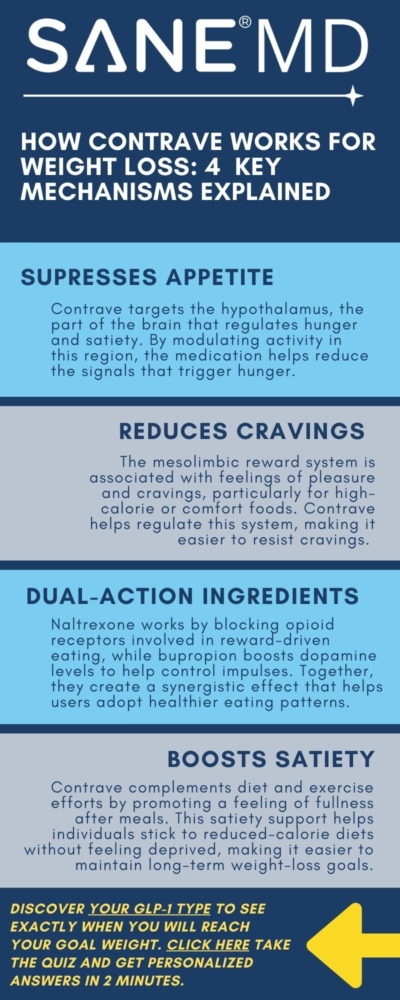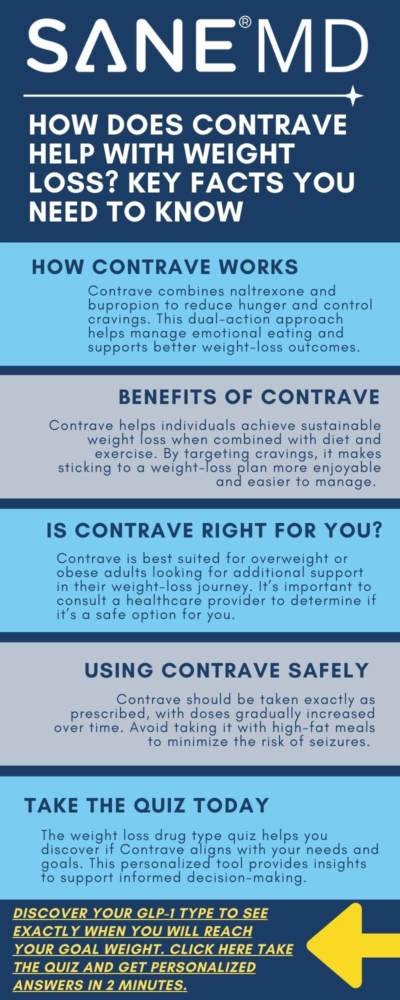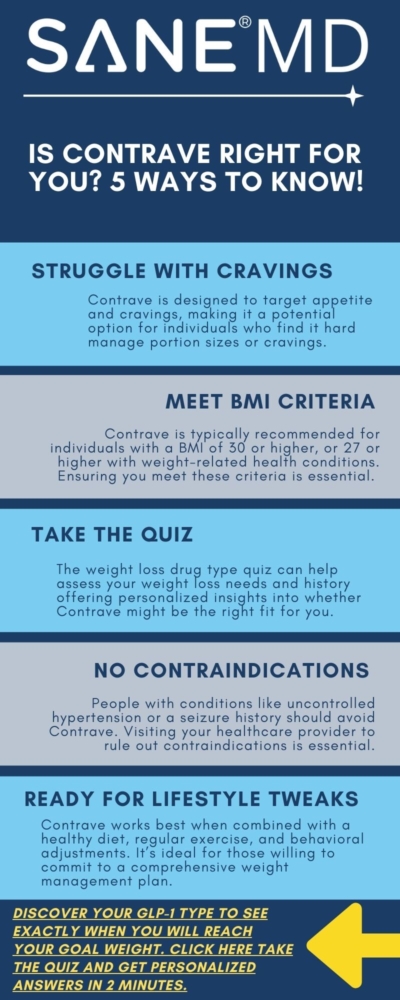How Contrave Works for Weight Loss: A Quiz to Determine if It’s Your Best Option
Contrave works for weight loss by targeting the brain’s appetite and reward centers to reduce hunger and control cravings. By helping regulate these pathways, it supports healthier eating habits. For optimal results, Contrave should be combined with a reduced-calorie diet and regular exercise (FDA Prescribing Information).
For those unsure if Contrave is right for them and whether it might suit their needs, a weight loss drug type quiz can offer valuable guidance.
Key Takeaways
Contrave’s unique features and benefits include:
- A combination of bupropion and naltrexone for weight management.
- Mechanisms that target hunger and cravings through the brain’s reward system.
- Enhanced effectiveness when paired with a healthy diet and exercise.
What is Contrave?
Contrave is a prescription weight-loss medication that combines two active ingredients: bupropion and naltrexone. Bupropion is often used to treat depression as well as for smoking cessation, while naltrexone is commonly prescribed for addiction treatment. Together, these ingredients work to support weight loss by reducing appetite and controlling cravings.
While Contrave is not approved for treating depression or psychiatric disorders, some individuals wonder whether its bupropion component—commonly used in antidepressants like Wellbutrin—may have mood-related effects. If you’re curious about the potential usage of Contrave for depression, check out our in-depth analysis.
Before starting Contrave, individuals should consult a healthcare provider to ensure the medication is appropriate for their medical history and current health needs.
How Contrave Works for Weight Loss
Contrave works by acting on two key areas of the brain:
- The Hypothalamus – This region regulates hunger and satiety. By altering its activity, Contrave helps suppress appetite.
- The Mesolimbic Reward System – This system influences pleasure and cravings. Contrave reduces the desire to eat for emotional or reward-driven reasons.
The combination of naltrexone and bupropion enhances satiety, reduces food intake, and promotes energy expenditure. While the exact neurochemical effects remain under study, these mechanisms are believed to help individuals achieve their weight loss goals.
Benefits of Contrave for Overweight and Obese Patients
Clinical research has demonstrated Contrave’s efficacy in aiding weight loss:
- Studies show that individuals who take Contrave alongside diet and exercise lose 2 to 4 times more weight than those relying on lifestyle changes alone.
- Nearly half of the participants in these studies lost at least 5% of their body weight.
Contrave is particularly effective when combined with lifestyle changes, such as a reduced-calorie diet and regular physical activity. By addressing both physical hunger and emotional cravings, it can serve as a valuable tool for individuals seeking long-term weight management. For those wondering if Contrave aligns with their goals, the weight loss drug type quiz can provide personalized insights.
Using Contrave with a Reduced-Calorie Diet
Contrave is most effective when paired with a reduced-calorie diet and increased physical activity. This combination ensures that users can maximize the medication’s benefits while adopting sustainable lifestyle changes.
Contrave acts as an adjunct therapy, meaning it supports individuals already making efforts to lose weight but struggling to see results. By enhancing satiety and reducing cravings, it helps individuals stay on track with their weight-loss journey.
Who is Contrave For?
Contrave is specifically designed for adults who are overweight or obese and are looking for an effective way to manage their weight. It is especially beneficial for those with a body mass index (BMI) of 30 or higher or for individuals with a BMI of 27 or higher who have a weight-related medical condition, like type 2 diabetes or high blood pressure.
Contrave is not just for anyone looking to shed a few pounds; it is intended for those who have struggled with weight loss through diet and exercise alone. It can be a valuable tool for those who need additional support to control cravings and reduce calorie intake.
However, it is essential to consult with a healthcare provider before beginning Contrave to ensure it aligns with your specific health needs and medical history. This is especially important for individuals with conditions like uncontrolled high blood pressure or a history of seizures, as Contrave may not be suitable for them.
Taking Contrave
To ensure safe and effective use of Contrave, it’s essential to follow these guidelines:
- Take as prescribed: Follow your healthcare provider’s instructions precisely.
- Avoid high-fat meals: Avoiding a high-fat meal is crucial because it can significantly increase drug levels in the body, raising the risk of adverse effects such as seizures.
- Opioid use: If you need to use opioid medication temporarily, inform your doctor, as Contrave’s naltrexone component can interfere with opioids.
- Storage: Keep Contrave at room temperature, away from moisture and heat.
By adhering to these recommendations, users can minimize risks and optimize the benefits of the medication.
Potential Side Effects
Like any medication, Contrave may cause side effects. Common and severe Contrave side effects include:
- Common side effects: Nausea, headache, dizziness, and dry mouth.
- Serious side effects: Seizures, severe headaches, or blurred vision.
There is an increased risk of seizures and other severe side effects, particularly in individuals with pre-existing vulnerabilities.
It’s crucial to watch for signs of an allergic reaction, such as swelling, hives, or difficulty breathing, and seek immediate medical attention if these occur. Because side effects vary between individuals, regular medical supervision is essential while using Contrave.
Drug Interactions
Contrave can interact with other medications, potentially altering their effectiveness. Key considerations include:
- Opioid medications: Naltrexone in Contrave can block the effects of opioids, reducing their efficacy.
- Monoamine oxidase inhibitors (MAOIs): Using MAOIs with Contrave is contraindicated due to the risk of hypertensive reactions.
- Other medicines: Inform your doctor of all other medicines you are taking, including prescription drugs, over-the-counter medicines, vitamins, and herbal products.
Check out our guide for a complete listing and analysis of Contrave drug interactions.
To ensure safety, discuss any potential drug interactions with a healthcare provider before starting Contrave.
Safety and Tolerability
Contrave carries certain risks, including:
- Boxed warnings: These highlight risks of suicidality and neuropsychiatric reactions associated with bupropion.
- Heart rate and blood pressure: Contrave may increase both, requiring regular monitoring.
- Seizure risk: Taking Contrave with high-fat meals significantly raises the risk of seizures.
By being aware of these risks, users can make informed decisions and work closely with their healthcare providers to monitor their response to the medication.
Efficacy of Contrave in Clinical Trials
Clinical trials have shown that Contrave can be a capable ally in the weight loss journey for overweight and obese patients. In these studies, participants who took Contrave in conjunction with a reduced-calorie diet and regular physical activity lost significantly more weight than those who relied on lifestyle changes alone. On average, individuals taking Contrave lost 2 to 4 times more weight compared to those who did not take the medication.
One of the key findings from these trials is that nearly half of the participants achieved a weight loss of at least 5% of their body weight. This level of weight loss can have meaningful health benefits, such as improved blood pressure, better control of blood sugar levels, and reduced risk of developing weight-related medical conditions.
The success of Contrave in these trials underscores the importance of combining the medication with a healthy diet and exercise. By addressing both physical hunger and emotional cravings, Contrave helps individuals stay committed to their weight loss goals and achieve sustainable results.
Cost and Accessibility
Contrave’s cost varies depending on insurance coverage and available savings programs. Some manufacturers offer discounts, making the medication more accessible to eligible patients. Additionally, free shipping options may be available through specific programs. For accurate pricing information, consult your healthcare provider or pharmacy.
Frequently Asked Questions about Contrave
Here, we address some of the most common questions about Contrave to assist you in making an informed choice.
What makes Contrave different from other weight loss medications?
Contrave is unique because it combines two active ingredients—bupropion and naltrexone—that target both hunger and cravings. This dual mechanism addresses both physical and emotional factors contributing to weight gain, setting it apart from other medications that may focus on just one aspect.
Can I take Contrave if I have other medical conditions?
Certain conditions, such as uncontrolled high blood pressure or a history of seizures, may make Contrave unsuitable. It’s vital to discuss your full medical history with a healthcare provider to determine if Contrave is safe and appropriate for you.
Does Contrave work for everyone?
Contrave’s effectiveness depends on individual factors, including adherence to a healthy diet and exercise plan. While many users achieve significant weight loss, it may not work equally well for everyone. Consulting with a healthcare provider can help set realistic expectations.
What should I do if I experience severe side effects?
If you experience severe side effects, such as a seizure or severe headache, contact your healthcare provider immediately. In emergencies, seek urgent medical attention to address any complications promptly.
How quickly do you lose weight on Contrave?
Many users start to see weight loss results within the first 12 weeks of taking Contrave, particularly when it’s used alongside a reduced-calorie diet and regular exercise. How fast you lose weight on Contrave varies depending on individual factors such as adherence to lifestyle changes and overall health. Regular check-ins with your healthcare provider can help monitor your progress and adjust your treatment plan as needed.
What is the downside of Contrave?
The primary downsides of Contrave include potential side effects, such as nausea, dizziness, and a risk of seizures, especially when taken with high-fat meals. Additionally, it may not be suitable for individuals with certain medical conditions, such as uncontrolled hypertension or a history of seizures. Close monitoring by a healthcare provider is crucial to minimize risks and ensure safety during treatment.
What does Contrave do to your metabolism?
Contrave targets specific areas of the brain to help control hunger and cravings but does not directly increase metabolism. Its effects on weight loss come from reducing calorie intake and encouraging lifestyle changes rather than altering the body’s metabolic rate. Combining Contrave with a healthy diet and regular exercise can optimize its benefits for weight management.
How can I make my Contrave work better?
To maximize the effectiveness of Contrave, pair it with a reduced-calorie diet and regular physical activity. Avoid high-fat meals to reduce the risk of side effects, and follow your healthcare provider’s instructions closely. Maintaining a consistent routine, staying hydrated, and tracking your progress can also help improve your results over time.
Conclusion
Contrave offers a scientifically backed option for individuals struggling with weight management. By addressing both hunger and cravings, it can complement diet and exercise efforts. However, it’s not suitable for everyone, so consulting a healthcare provider is crucial. To explore if Contrave is a good fit for your weight-loss journey, consider taking the weight loss drug type quiz to gain personalized insights.
Can Contrave Help You Lose Weight? Take the Quiz Today!
Losing weight can be a challenging journey, often requiring a combination of lifestyle changes, willpower, and support. For many, achieving and maintaining weight loss can feel overwhelming, especially when hunger and cravings persist. Contrave, a prescription weight-loss medication, offers a potential solution for those struggling to shed excess weight. Contrave is approved by the Food and Drug Administration (FDA) for weight loss. But does Contrave work for weight loss?
To help you determine if Contrave is the right fit for your weight loss journey, we’ve prepared this guide. You can also take the weight loss drug type quiz, which provides personalized insights into the best options based on weight loss goals and other factors. This article explores Contrave’s mechanisms, benefits, risks, and safe usage practices, equipping you with the knowledge needed to make informed decisions.
Key Takeaways
- Contrave combines naltrexone bupropion to target hunger and cravings in the brain.
- It is most effective as part of a comprehensive weight-loss program, including diet and exercise.
- A weight loss drug type quiz can help you determine if Contrave is a suitable option.
What is Contrave (Naltrexone Bupropion) and How Does it Work?
Mechanism of Action
Contrave is a combination medication that includes naltrexone and bupropion, two drugs traditionally used for other purposes. Naltrexone is commonly prescribed to manage addiction, while bupropion is an antidepressant that can also assist with smoking cessation. Bupropion is also used to treat depression, adding a psychological benefit to the medication. Together, they work on the central nervous system and areas of the brain involved in regulating hunger and cravings.
Contrave’s mechanism aims to reduce the constant drive to eat by influencing two key brain areas: the hypothalamus, which controls appetite, and the mesolimbic reward system, which influences cravings. This dual-action approach can help individuals reduce their food intake and resist emotional eating triggers.
If you’re unsure whether Contrave aligns with your weight-loss needs, the weight-loss drug type quiz can provide valuable guidance.
Can Contrave Help You Lose Weight?
Clinical studies show that Contrave can assist your weight control efforts with the following actions:
Effective Weight Loss Results
Contrave has been shown to help individuals achieve sustained weight loss when used as part of a comprehensive plan. Clinical trials have demonstrated its potential to assist with shedding pounds and maintaining results over time.
Studies suggest that individuals using Contrave experience greater weight loss compared to those relying solely on diet and exercise. By taking the weight loss drug type quiz, you can determine whether Contrave’s benefits match your goals.
For those asking, ‘Is Contrave the best weight loss solution’, clinical studies suggest that it can be effective when combined with diet and exercise.
Reduced Cravings and Emotional Eating
One of Contrave’s strengths is its ability to address emotional eating and cravings. Emotional eating is a significant barrier to weight loss for many individuals, often leading to overeating or choosing unhealthy foods.
Contrave helps to curb these tendencies, offering a pathway to better control over eating habits. By tailoring treatment to individual needs, including emotional triggers, Contrave users may experience improved weight-loss outcomes. Users should monitor for symptoms of low blood sugar, especially if they have diabetes.
How Contrave Supports a Reduced-Calorie Diet
For Contrave to be effective, it must be combined with a reduced-calorie diet and increased physical activity. The medication helps users adhere to their diet plans by reducing hunger and making it easier to avoid overeating.
In the long term, Contrave encourages sustainable lifestyle changes, such as healthier eating patterns and regular exercise, which are crucial for maintaining weight loss.
Potential Side Effects and Risks
Common Side Effects
As with any medication, Contrave may cause side effects. Commonly reported issues include:
- Nausea, constipation, and headache
- Dizziness, insomnia, and dry mouth
- Serious skin reactions, such as blistering and a severe skin rash
These side effects are typically mild and may subside over time as the body adjusts to the medication. However, if these symptoms persist or worsen, it is important to consult your healthcare provider.
Serious Side Effects
Although rare, serious side effects can occur with Contrave, including:
- Serious allergic reaction
- Seizures or suicidal thoughts
- Liver damage and significant mood changes
Seek immediate medical attention if you experience any of these symptoms. It’s crucial to weigh the benefits and risks of Contrave with your healthcare provider before starting treatment.
Who Should Not Take Contrave
Contraindications
Contrave is not suitable for everyone. You should avoid using this medication if you:
- Have uncontrolled high blood pressure or a history of seizure disorders
- Are currently dependent on opioids or have recently stopped using them
- Are pregnant, breastfeeding, or planning to become pregnant
Always discuss your medical history with your healthcare provider before starting this or any medication.
Important Safety Information
Interactions with Foods and Medications
Contrave can interact with certain foods and medications, which may affect its efficacy or increase the risk of side effects. Here are some important interactions to be aware of:
- High-fat meals: Taking Contrave with high-fat meals can increase the risk of seizures. It’s recommended to avoid taking Contrave with high-fat meals.
- Medications: There are several drug interactions to be aware of. Contrave can interact with certain medications, such as monoamine oxidase inhibitors (MAOIs), and increase the risk of serious side effects. Inform your doctor about all medications you’re taking, including over-the-counter (OTC) medications and herbal supplements. This also includes alcohol intake, as Contrave and alcohol drug interactions can be serious.
- Foods: Grapefruit and grapefruit juice can increase the levels of bupropion in your blood, which may increase the risk of side effects. Avoid consuming grapefruit or grapefruit juice while taking Contrave.
How to Use Contrave Safely and Effectively
Dosage and Administration
The typical starting dosage for Contrave is one tablet daily, with the dose gradually increasing to two tablets per day during the second week. In the case of a missed dose, wait until your next scheduled dose. Never take a double dose. It’s important to take Contrave exactly as prescribed and to avoid taking it with high-fat meals, which can increase the risk of seizures.
Following your healthcare provider’s instructions closely will ensure the safest and most effective use of the medication.
Monitoring and Follow-Up
Regular follow-up appointments with your healthcare provider are essential while taking Contrave. During these visits, your provider will monitor your:
- Blood pressure
- Overall health and response to the medication
- Symptoms of low blood sugar, especially if you have diabetes
Adjustments to your treatment plan may be necessary to optimize results and address any concerns.
Talking to Your Doctor
Before starting Contrave, it’s essential to discuss your medical history and any concerns you may have with your doctor. Here are some topics to discuss:
- Medical conditions: Inform your doctor about any medical conditions you have, including high blood pressure, high cholesterol, or type 2 diabetes.
- Medications: Tell your doctor about all medications you’re taking, including OTC medications and herbal supplements.
- Allergies: Inform your doctor about any allergies you have, including allergies to naltrexone or bupropion.
- Pregnancy and breast-feeding: Contrave is not recommended for pregnant or breastfeeding women. Inform your doctor if you’re pregnant or breastfeeding.
- Mental health: Contrave can increase the risk of suicidal thoughts and behaviors, especially in people with a history of depression or bipolar disorder. Inform your doctor about any mental health conditions you have.
Engaging in these discussions with your doctor ensures that Contrave is both safe and effective for your specific needs.
Frequently Asked Questions (FAQ)
Many individuals have questions about how Contrave works and whether it is the right choice for their weight-loss journey. Below are answers to some of the most common queries.
1. What is Contrave used for?
Contrave is a prescription medication designed to aid in weight management for overweight and obese adults, specifically those with a body mass index above a certain threshold. It is intended for use alongside a reduced-calorie diet and regular exercise to enhance weight-loss outcomes.
2. How soon can I expect results with Contrave?
Results vary from person to person. Many users report noticeable weight loss within the first few months of consistent use. The key is combining Contrave with healthy eating and physical activity to maximize results.
3. What are the common side effects of Contrave?
Common side effects include nausea, headache, constipation, and dizziness. While these symptoms are often temporary, it is important to inform your healthcare provider if they persist or become bothersome.
4. Can anyone take Contrave?
Contrave is not suitable for everyone. Individuals with certain health conditions, such as uncontrolled high blood pressure or a history of seizures, should avoid taking this medication, as they are at an increased risk of complications.
5. Is Contrave a standalone solution for weight loss?
Contrave is not a standalone solution. It works best as part of a comprehensive weight-loss program that includes dietary changes, regular physical activity, and behavioral adjustments. Combining it with personalized medical guidance and lifestyle modifications enhances its effectiveness for sustainable weight management.
Conclusion
Contrave offers a potential pathway to effective weight loss for those struggling with hunger and cravings. However, it is most effective when combined with a healthy lifestyle and used under the guidance of a healthcare provider.
To explore whether Contrave might be right for you, consider taking the weight loss drug type quiz and consulting your doctor to create a personalized weight-loss plan tailored to your needs. Contrave is approved by the Food and Drug Administration (FDA) for weight management.
Is Contrave Right for You? Take the Quiz to Find Out!
Contrave, naltrexone bupropion, is an FDA-approved prescription weight loss medication designed to support compatible individuals — specifically overweight and obese adults — struggling with obesity or weight management challenges. Unlike quick-fix solutions, it works by targeting two key areas: appetite control and food cravings, which are often barriers to achieving long-term success.
However, it’s important to recognize that weight loss drugs like Contrave aren’t suitable for everyone. Factors such as health conditions, lifestyle, and personal goals play a significant role in determining whether this medication could be a viable option.
But is Contrave right for you? Personalization is key when it comes to choosing the right weight loss approach. No two individuals are alike, and what works for one person may not work for another. That’s where tools like a weight loss drug type quiz come in handy. By considering your weight management history and weight loss needs, a quiz can provide valuable insights into whether Contrave might be the right fit for your journey.
Key Takeaways
- Contrave is a prescription medication that helps regulate appetite and cravings.
- Eligibility depends on various factors, including health conditions and weight loss goals.
- A personalized weight loss drug type quiz can help determine if Contrave aligns with your needs.
- The cost of Contrave can vary, but potential savings options such as coupons and manufacturer’s programs are available. There is no generic version, which typically costs less, and insurance may affect the overall cost.
What is Contrave?
Contrave is a prescription weight loss medication designed to address two common challenges in weight management: controlling appetite and reducing food cravings. It combines two active ingredients, naltrexone and bupropion, which work together to influence areas of the brain involved in hunger and reward.
Naltrexone, often used in treating addiction, plays a role in reducing cravings, while bupropion, commonly prescribed for depression and smoking cessation, may help regulate appetite. This dual-action approach makes Contrave unique among weight loss medications.
The COR-BMOD study within the Contrave Obesity Research trial series incorporated more rigorous behavioral counseling interventions, such as guidance from exercise specialists and dietitians. This intensive lifestyle modification led to greater weight loss outcomes compared to other studies that utilized standard lifestyle changes.
However, it’s important to remember that the effectiveness of Contrave can vary significantly from person to person. Factors such as genetics, lifestyle, and underlying health conditions all influence how well the medication works. For some, Contrave may provide the support needed to overcome weight loss plateaus, while others may not experience the same benefits. Additionally, Contrave is intended for obese patients who may have comorbid conditions such as dyslipidemia, which can impact treatment outcomes.
Who Might Benefit from Contrave?
Contrave is typically prescribed to individuals who meet specific criteria, such as having a body mass index (BMI) of 30 or higher (classified as obese) or a BMI of 27 or higher with weight-related health conditions like type 2 diabetes or high blood pressure. These guidelines help ensure that the medication is used by those who may benefit most from its effects.
Beyond BMI, other factors such as medical history, lifestyle habits, and weight loss goals can influence whether Contrave is an appropriate choice. For instance, individuals who struggle with emotional eating or find it difficult to curb cravings might see the most benefit. However, those with certain health conditions or who take specific medications may not be suitable candidates. While bupropion, one of Contrave’s ingredients, is approved to treat depression and aid in smoking cessation, Contrave itself is specifically approved for weight management.
It’s essential to consult a healthcare professional when considering Contrave, but tools like a weight loss drug type quiz can serve as a helpful first step. By analyzing your unique circumstances, the quiz can identify if you meet the criteria and whether Contrave could fit into your overall weight management strategy.
Potential Benefits and Limitations
Contrave offers potential benefits for individuals struggling with weight management, but it’s essential to weigh these against its limitations before deciding if it’s right for you. The clinical studies assessing the efficacy and safety of Contrave were placebo-controlled, highlighting the significance of these studies in evaluating treatment effects.
Potential Benefits
- Appetite Regulation: Contrave helps control appetite by targeting brain areas responsible for hunger, making it easier to manage portion sizes and avoid overeating. It raises dopamine and norepinephrine levels in the brain, which helps regulate appetite. This can help you eat a reduced-calorie diet without hunger or willpower.
- Reduced Cravings: The combination of naltrexone and bupropion is designed to minimize food cravings, especially for high-calorie, sugary, or fatty foods.
- Support for Long-Term Weight Management: By addressing common obstacles like overeating and emotional eating, Contrave may assist in maintaining consistent weight loss over time, especially when paired with lifestyle changes like a healthy diet and regular exercise.
Clinically Proven to Aid in Weight Loss
Contrave has been clinically shown to assist with weight loss and maintenance when used alongside a healthy diet and regular exercise. In clinical studies, individuals who were overweight or suffering from obesity lost approximately 2-4 times more weight over one year by adding Contrave to their regimen compared to those who relied on diet and exercise alone.
Nearly half of the patients taking Contrave achieved a weight loss of 5% or more of their body weight and were able to maintain it, compared to just 23% of patients taking a placebo. These results highlight the potential of Contrave to enhance weight loss efforts and support long-term weight management significantly.
Limitations
Possible Side Effects
Common Contrave side effects include nausea, headache, and dizziness. In rare cases, more severe reactions may occur, such as increased blood pressure or mood changes, and low blood sugar in those taking certain oral medications for type 2 diabetes. There is also an increased risk of mania, especially in individuals with pre-existing mental health conditions or family histories of bipolar disorder. Monitoring for signs of mania is crucial.
Need for Medical Supervision
Regular monitoring by a healthcare provider is essential to ensure safety and efficacy, as well as to address any adverse effects promptly.
While these benefits and limitations provide a general overview, individual experiences with Contrave can vary significantly.
Who Should Not Take Contrave?
While Contrave can be an effective weight loss tool for many, it is not suitable for everyone. Certain medical conditions and medications can make its use unsafe. The following individuals should not take Contrave:
- Those with high blood pressure that is not controlled
- Individuals with a history of seizures
- People with a history of eating disorders, such as anorexia or bulimia
- Those who have recently stopped drinking alcohol
- Individuals who have recently stopped taking certain anxiety, sleep, headache, or anti-seizure prescription drugs
- Those who take opioids long-term
- Individuals who take medications called monoamine oxidase inhibitors (MAOIs), such as selegiline, linezolid (Zyvox), or methylene blue
- Those who take other medications containing bupropion, such as Wellbutrin, Forfivo XL, or Aplenzin
- Individuals with an allergy to naltrexone or bupropion, as it may cause a severe and even life-threatening allergic reaction
In addition, women on hormonal birth control should practice caution, as Contrave and birth control drug interactions may occur, potentially making contraceptive less effective. It’s essential to discuss your medical history and current medications with your healthcare provider to determine if Contrave is a safe option for you.
Using Contrave Safely
To use Contrave safely, it’s important to follow the recommended dosage and administration guidelines provided by your healthcare provider:
- Take Contrave exactly as prescribed.
- Swallow the tablets whole; do not chew, cut, or crush them.
- Do not take more than 2 tablets at one time or more than twice a day.
- You can take Contrave with food, but avoid high-fat meals to reduce the risk of seizures.
- Follow the dosing schedule at the beginning of treatment to help your body adjust to the medication.
- Be aware that Contrave can raise the risk of unusual behavior and suicidal thoughts and actions.
It’s crucial to discuss any changes in mood with your healthcare provider and to adhere to their guidance on using Contrave safely and effectively. By following these instructions, you can minimize risks and maximize the benefits of this weight loss medication.
How to Know if Contrave is Right for You
Deciding if Contrave is right for you requires careful consideration of your personal health and lifestyle.
Consulting with a healthcare provider is essential, but understanding your unique circumstances can help you prepare for that conversation. If you are pregnant or planning to become pregnant, it is important to consult your healthcare provider before using Contrave.
Factors to Consider
- Lifestyle: Contrave works best when combined with lifestyle changes such as healthy eating and increased physical activity. Consider whether you’re ready to commit to these adjustments.
- Weight Loss History: If you’ve struggled to achieve or maintain weight loss with diet and exercise alone, Contrave might provide the added support you need.
- Health Goals: Reflect on your long-term objectives, such as improving mobility, reducing health risks, or enhancing overall well-being.
Taking these factors into account, tools like a personalized weight loss drug type quiz can help streamline your decision-making process. The quiz considers key aspects such as your weight loss history and goals, providing a personalized starting point for evaluating whether Contrave fits into your journey. Read our guide, Is Contrave the Right Fit for your Weight Loss Journey,” for a deeper exploration.
Frequently Asked Questions
Here are answers to common questions about Contrave and how it might fit into your weight loss journey.
Q1: Are there side effects?
Like any medication, Contrave has potential side effects. For example, both Contrave and Saxenda may increase the risk of suicidal thoughts and behaviors, highlighting the importance of understanding the potential risks associated with these treatments.
Common side effects include nausea, constipation, headache, vomiting, dizziness, insomnia, dry mouth, and diarrhea. It is important to discuss these with your healthcare provider to ensure that Contrave is a safe option for you.
Q2: What are the eligibility requirements for Contrave?
Contrave is FDA-approved for adult use and is not approved for children. It is typically prescribed for adults with a body mass index (BMI) of 30 or greater or for those with a BMI of 27 or greater who also have weight-related medical conditions such as type 2 diabetes, high blood pressure, or high cholesterol.
Your healthcare provider will evaluate your medical history and current health status to determine if Contrave is a suitable option for you.
Q3: How does Contrave work?
Contrave combines two active ingredients, naltrexone and bupropion, to help manage appetite and cravings. Naltrexone reduces food cravings by targeting the brain’s reward system, while bupropion helps regulate appetite by influencing neurotransmitters. Contrave raises dopamine and norepinephrine levels in the brain, which helps manage appetite and cravings.
Together, these components address some of the most common challenges in weight loss. However, Contrave works differently for each person, depending on individual health factors.
Q4: What are the eligibility requirements for Contrave?
Contrave is generally prescribed for adults with a body mass index (BMI) of 30 or higher or those with a BMI of 27 or higher who also have weight-related health conditions, such as type 2 diabetes or high cholesterol. It is an FDA-approved medication specifically for weight management in adults.
Additionally, healthcare providers consider other factors, including medical history and current medications, before prescribing it.
Q5: Are there side effects?
Contrave may cause side effects. Common ones include nausea, headache, dizziness, and constipation, which often improve as your body adjusts to the medication. Serious side effects, though rare, can include increased blood pressure or mood changes. Examples of specific negative effects that may occur from using Contrave in conjunction with alcohol include agitation, depression, and sleeping problems.
Discussing potential side effects with a healthcare provider is crucial to determine whether the benefits outweigh the risks in your case.
Q6: Can Contrave be used with other weight loss methods?
Contrave is most effective when used alongside lifestyle changes like a healthy diet and regular exercise. Consuming high-fat meals can increase the level of Contrave in the body, potentially leading to heightened side effects.
It’s important to consult your doctor before combining it with other weight loss medications or supplements, as interactions can occur. In many cases, Contrave complements other non-medical strategies, such as behavioral counseling or meal planning, to support long-term success.
Q5: How can I know if Contrave is right for me?
Determining whether Contrave can help you safely lose weight depends on factors like your health status, weight loss history, and lifestyle. Consulting a healthcare provider is an essential step.
Taking a weight loss drug type (quiz here) is a great first step, as it can provide personalized insights and simplify the decision-making process. Additionally, if you decide to use Contrave, be sure to store it in a cool, dry place.
Conclusion
Contrave is a prescription weight loss medication designed to help individuals overcome common obstacles like appetite control and food cravings. While it can be an effective tool for some, it’s essential to remember that weight loss drugs are not a one-size-fits-all solution. Factors like medical history, lifestyle, and personal health goals play a significant role in determining if Contrave is the right option.
The decision to use Contrave should always be made in consultation with a healthcare provider. They can help evaluate your eligibility, discuss potential benefits and risks, and ensure the medication fits into a broader weight management strategy.
If you’re curious about whether Contrave could be a fit for your journey, tools like a personalized weight loss drug quiz can offer valuable insights. By considering your unique circumstances, the quiz might provide the clarity you need to take the next step toward a healthier, more confident you.




















